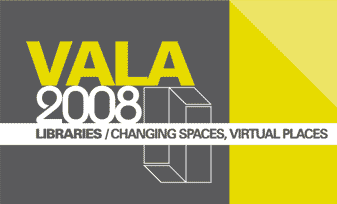 Changing library spaces: finding a place for print
Changing library spaces: finding a place for print
VALA 2008 CONCURRENT SESSION 5: Library Spaces
Tuesday 5 February 2008, 15:10 – 15:40
Persistent URL: http://www.vala.org.au/vala2008-proceedings/vala2008-session-5-jilovsky
 Cathie Jilovsky
Cathie Jilovsky
Information Services Manager, CAVAL Collaborative Solutions
http://www.caval.edu.au
Paul Genoni
Faculty of Media, Society and Culture, Curtin University of Technology
http://www.curtin.edu.au
Please tag your comments, tweets, and blob posts about this session: #VALA2008
Abstract
This paper considers the storage options for print collections in a digital environment. Recent changes to library space use in particular are reducing the space available for print storage and forcing libraries to look to other solutions, including print repositories. Repositories potentially produce benefits to the networks of libraries they serve; to individual libraries within the network, and to the communities of researchers that using those libraries. The paper emphasises the Australian situation, and the discussion encompasses the policy developments that are necessary to optimise the benefits of a fully implemented national print repository for Australia.

 Changing library spaces: finding a place for print
Changing library spaces: finding a place for print VALA 2008 PLENARY 3: Narayanaswamy Balakrishnan
VALA 2008 PLENARY 3: Narayanaswamy Balakrishnan VALA 2008 PLENARY 2: Sandy Payette
VALA 2008 PLENARY 2: Sandy Payette